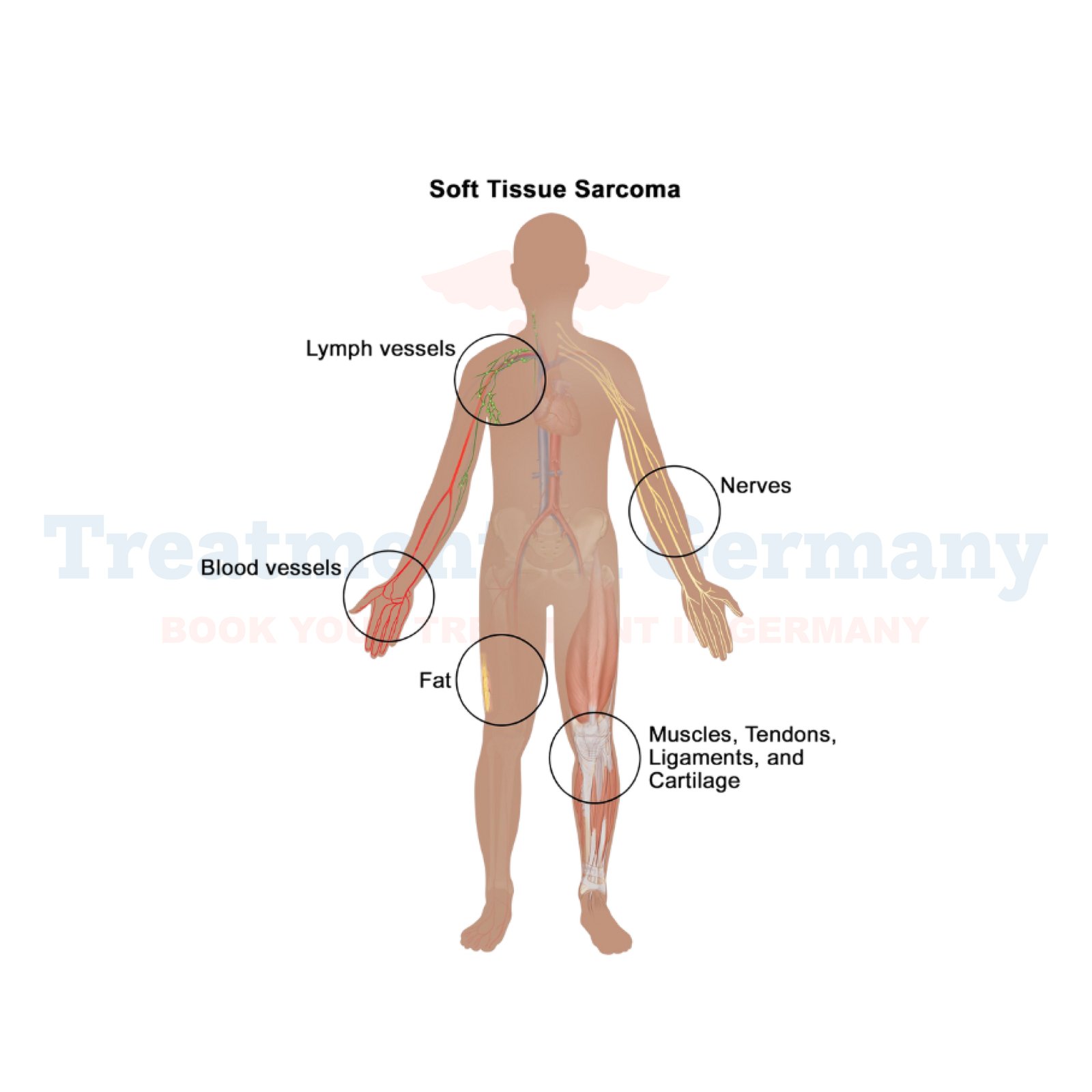Soft tissue sarcomas are a collection of an extremely rare group of cancers that arise in the connective tissues of the body, including muscles, tendons, fat, and skin. With their heterogeneity, in most cases often being asymptomatic in initial stages, soft tissue sarcomas are found to be difficult to diagnose and treat.
Germany has now become a leading global destination for managing soft tissue sarcomas, offering new diagnostic techniques and cutting edge methods of specific treatment based on the individual's condition.
Soft tissue sarcomas are malignant tumors from abnormal cells in the connective tissues. They arise anywhere in the body, though commonly in the arms, legs, abdomen, or chest. They represent rare cancer tumors, which are less than 1% of cancers in adults but a higher percentage among children's cancers. If left untreated, they become metastatic, spreading to other parts of the body.
Types of Soft Tissue Sarcomas
Soft tissue sarcomas are categorized into more than 50 subtypes that differ in their aggressiveness and the tissues involved. The most common types are:
Undifferentiated Pleomorphic Sarcoma
This is an aggressive cancer type most commonly found in the legs, arms, or chest; hence, it grows rapidly, and prompt intervention is necessary.
Liposarcoma
It is the cancer type involving cells that produce fats and is common in the thighs, abdomen, or retroperitoneum.
Leiomyosarcoma
This kind usually occurs in smooth muscles, such as those that form inside the uterus, intestines, and blood vessels.
Rhabdomyosarcoma
It is a form of cancer that occurs mainly in children. Originating from skeletal muscle tissues, it is curable but liable to recurrence.
Soft Tissue Sarcoma Ewing Sarcoma
Risk factors and causes of soft tissue sarcoma
The cause of soft tissue sarcomas is not defined precisely, but various factors predispose individuals to the disease.
Genetic Predispositions
Some genetic mutations are inherited, wherein people are predisposed to such cancers, including:
Other Contributing Factors
Soft Tissue Sarcomas Symptoms
Soft tissue sarcomas are often asymptomatic in their early stages. They cause symptoms only when:
Diagnostic Procedures in Germany
Germany's health care systems use complex diagnostic procedures to diagnose and grade soft tissue sarcomas accurately.
Physical Examination
Initial screenings for unusual masses and their characteristics are done.
Imaging Tests
Biopsy and Pathology Examination
A biopsy is obtained, and a pathologist examines the tissue to determine the type, grade, and stage of cancer. The treatment decision will also depend on it.
Stages of Soft Tissue Sarcomas
Stages are classified according to the size, grade, location, and spread of the tumor.
Cancer staging can thus guide individualized treatment plans.
Treatment Options in Germany
Germany is considered a leader when it comes to advanced and innovative treatments for soft tissue sarcomas.
Surgery
Surgery is the main treatment for localized sarcomas. Radical resection is preferred, with wide margins achieved to reduce local recurrence.
Radiation Therapy
Its use is either in neoadjuvant form surgery or adjuvant form post-surgery, therefore eliminating residual cancer cells. This is highly precise and reduces tissue damage.
Chemotherapy
Chemotherapy remains mainly a systemic modality of treatment targeting the killing of abnormal cells. Chemotherapy is therefore considered the best adjuvant in high-grade as well as metastatic sarcomas.
Targeted Therapy
This approach blocks certain proteins or genes that promote tumor growth. it is less invasive than more traditional treatments.
Immunotherapy
Life After Treatment of Soft Tissue Sarcoma
Survivorship and Follow-Up
The care post-treatment is also observed with frequent follow-up for reoccurrence and late effects. Child life specialists or survivorship programs are often useful to the patient.
Emotional and Nutritional Care
Why choose Germany for soft tissue sarcoma treatment?
Germany combines the last word in medical technology with professionals who have broad experience in the treatment of complex cancers such as soft tissue sarcomas. From excellent diagnostics to individualized treatment programs, Germany offers patients access to the best possible care and innovations in medicine.
Frequently Asked Questions
What kinds of soft tissue sarcomas can be treated in Germany?
Germany successfully treats all the most important types, like liposarcoma, leiomyosarcoma, rhabdomyosarcoma, and Ewing sarcoma, in soft tissue.
How would a sarcoma be diagnosed?
Diagnosis involves a combination of imaging techniques, for instance, MRI scans and CT scans that are often supported with biopsies and interpreted by an experienced pathologist.
Are soft tissue sarcomas curable?
It is possible to cure many sarcomas in early diagnosis and through surgery, radiation, or chemotherapy.
Why is staging crucial to sarcoma treatment?
It helps to identify the size, grade, and degree of spread of the tumor, guiding the treatment approach appropriately so that the best possible outcome is realized.
What role does innovation play in Germany's cancer care?
Germany is focused on innovations that give access to advanced therapies such as targeted therapy and immunotherapy, which boost survival chances.
👉 Contact us for further information and receive a complimentary consultation.


.webp)
 (1).webp)

.webp)
 (1).webp)


.webp)
 (1).webp)

.webp)
 (1).webp)
